Journaling is a powerful tool that can have profound effects on our productivity, clarity, and mental health. By putting pen to paper and documenting our thoughts, feelings, and experiences, we can gain insight into our inner workings, clarify our goals and priorities, and cultivate a greater sense of well-being. In this article, we'll explore how to journal every day effectively to harness its benefits and enhance various aspects of our lives.
Understanding the Benefits of Daily Journaling
Before delving into the practical tips for journaling every day, let's first understand why it's such a valuable practice:
- Increased Productivity: Daily journaling can help increase productivity by providing a space to organize your thoughts, set goals, and track your progress. By writing down your tasks, priorities, and deadlines, you can clarify your objectives and stay focused on what needs to be done.
- Enhanced Clarity: Journaling can bring clarity to your thoughts and emotions, helping you make sense of complex situations and navigate difficult decisions. By reflecting on your experiences and examining your thoughts more closely, you can gain insight into your motivations, fears, and desires.
- Improved Mental Health: Daily journaling has been shown to have numerous mental health benefits, including reduced symptoms of anxiety and depression, increased self-awareness, and enhanced emotional regulation. By expressing your thoughts and feelings in a safe and non-judgmental space, you can release pent-up emotions and cultivate a greater sense of peace and well-being.
Now, let's explore some practical tips for journaling every day to harness these benefits:
Establish a Routine:
Consistency is key when it comes to daily journaling, so it's essential to establish a regular routine for your practice. Choose a specific time of day to journal, whether it's first thing in the morning, before bed, or during your lunch break. By incorporating journaling into your daily routine, you'll make it a non-negotiable part of your day and ensure that you prioritize your mental health and well-being.
Set Intentions:
Before you begin journaling, take a moment to set intentions for your practice. What do you hope to achieve through journaling today? Whether it's gaining clarity on a specific issue, processing your emotions, or brainstorming ideas, clarifying your intentions can help guide your writing and make your journaling sessions more focused and purposeful.
Choose Your Format:
There's no one right way to journal, so feel free to choose a format that works best for you. Some people prefer to write long-form entries, pouring out their thoughts and feelings onto the page. Others may prefer to use bullet points, lists, or prompts to guide their writing. Experiment with different formats and find what resonates with you.
Write Freely:
When journaling, it's important to write freely and without judgment. Allow your thoughts to flow onto the page without censoring or editing yourself. Remember, your journal is a safe and private space for you to express yourself authentically, so don't worry about spelling, grammar, or punctuation. Focus on getting your thoughts and feelings out of your head and onto the page.
Reflect and Review:
Take time to reflect on your journal entries and review them periodically. Notice any patterns or themes that emerge in your writing and reflect on how your thoughts and feelings are evolving over time. Reviewing your journal entries can provide valuable insights into your growth, progress, and areas for further exploration.
Experiment with Prompts:
If you're ever feeling stuck or unsure of what to write about, consider using journaling prompts to stimulate your creativity and inspiration. Prompts can help you explore specific topics or themes, such as gratitude, self-reflection, goal-setting, or problem-solving. There are countless journaling prompt books, websites, and apps available to provide you with endless inspiration.
Embrace Imperfection:
Finally, remember that journaling is a personal practice, and there's no right or wrong way to do it. Don't put too much pressure on yourself to write perfectly or have profound insights every day. Instead, focus on the process of journaling and allow yourself to express whatever thoughts and feelings come up for you. Embrace imperfection and trust that your journaling practice will evolve and grow over time.
Conclusion
Journaling every day is a simple yet powerful practice that can have profound effects on your productivity, clarity, and mental health. By establishing a regular routine, setting intentions, choosing your format, writing freely, reflecting and reviewing, experimenting with prompts, and embracing imperfection, you can harness the transformative benefits of journaling and enhance various aspects of your life. So why not take the first step today and commit to making journaling a daily habit? With consistent practice and intention, you can tap into the wisdom of your innermost thoughts and feelings and cultivate a greater sense of well-being and fulfillment.
Learn more: We Make the World's Best Planners & Journals | Productivity Store








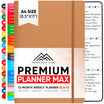





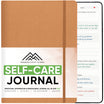

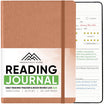
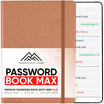
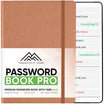




Leave a comment
All comments are moderated before being published.
This site is protected by hCaptcha and the hCaptcha Privacy Policy and Terms of Service apply.